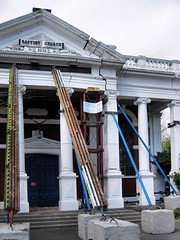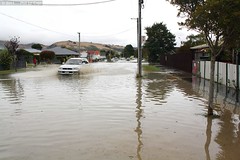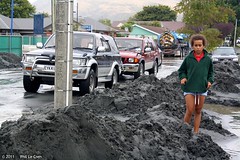
Search
Images for canterbury earthquakes; more images...
BeckerFraserPhotos April 2011 photograph 481
Images, UC QuakeStudies
The inside of a tent set up in the Arts car park at the University of Canterbury after the 22 February 2011 earthquake. The tents were used as temporary lecture rooms while the buildings were being checked for damage.
An empirical analysis of the Christchurch residential mortgage market: pos…
Research Papers, Lincoln University
The housing and mortgage market in Christchurch experienced significant changes since the 2011 earthquake, especially after the reconstruction of the city. The increasing speed of Christchurch average house price exceed the average house price of the whole country, as well as the number of new dwellings. By this regard, this study surveyed the households in Christchurch to analyze the effect of the earthquake on housing and mortgage market. This includes factors such as housing price, interest rate, government policy and socioeconomic factors in terms of age, gender, educational attainment, income, marital status and family life cycle. Logistic regression model is used to analyze the data. The study provides an overview of the housing market and mortgage market in Christchurch. The logistic regression, results show changes on sensitivity between the socio-economic factors and house purchase, as well as mortgage borrowing pre- and post-earthquake. The result indicates that the earthquake in Christchurch has affected households’ decision on house purchase and mortgage borrowing.
Back on track in North Canterbury
Audio, Radio New Zealand
Resilience and community spirit have shone through in North Canterbury in the aftermath of the earthquake. With no active civil defence post in operation in Cheviot in the days after the 7.8 quake, a group of locals mobilised a task force to support those in need. Further north at Mendip Hills Station farm manager Simon Lee has been repairing broken water pipes and clearing slips in time for weaning, while on Ben Lissington's dairy farm near Waiau, milk tankers are having to go off the beaten track to get to the rotary shed after a six metre section of the road was destroyed.
New Zealand Defence Force photograph 519
Images, UC QuakeStudies
The Taiwanese Ambassador speaking to the Taiwanese Search and Rescue team at Christchurch International Airport. The team is heading home after helping with the emergency response to the Canterbury Earthquake.
Lawyer argues design faults did not cause CTV to collapse
Audio, Radio New Zealand
The lawyer for the man whose company designed the CTV building says it was the strength and number of Canterbury earthquakes that caused its collaspe, and not any design faults.
Construction of 35 million dollar bridge to take 2 years
Audio, Radio New Zealand
The construction of the first bridge in Canterbury to be built to the new earthquake design codes is going to take nearly two years and cost over 30 million dollars.
Snow means students miss out on precious exam prep
Audio, Radio New Zealand
Heavy snow is forcing schools to close across the country. It's a double blow for Canterbury students who have already lost weeks of precious school time due to the earthquakes.
Small suburban businesses feel neglected by Chch council
Audio, Radio New Zealand
A group of small business owners in earthquake stricken Canterbury say they need a one hundred million dollar cash injection if they are to make it into the New Year.
Overseas expert shocked at design of PGC building
Audio, Radio New Zealand
An American engineer has told the Canterbury Earthquakes Royal Commission he was shocked at the failure of builders to properly fix the floors of the PGC building to its walls.
Quake victims say pending rates rise will cripple them
Audio, Radio New Zealand
Shell shocked residents still picking up the pieces in one of the worst earthquake affected parts of Canterbury, say a looming rates rise to pay for repairs will cripple them.
Rural Recovery - A Quake Aftermath
Audio, Radio New Zealand
Cosmo Kentish-Barnes finds out how the rural recovery is going near the epicentre of the Canterbury Earthquake that shook the province in the early hours of September 4th.
Families react to firm destroying CTV design information
Audio, Radio New Zealand
The director of the structural engineering company that designed the CTV building came under fire yesterday over documents missing from evidence his firm submitted to the Canterbury Earthquakes Royal Commission.
Role of engineer in inspecting Chch building under spotlight
Audio, Radio New Zealand
A structural engineer who ordered a building green stickered though he'd failed to do another thorough check on it has defended his inspections at the Canterbury Earthquakes Royal Commission.
Springsteen to play in Chch on eve of quake anniversary
Audio, Radio New Zealand
The Boss is back - and he and his band, the E Street band, are going to Christchurch on the eve of the sixth anniversary of the Canterbury earthquake this summer.
Observatory Tower Photograph 31
Images, UC QuakeStudies
A photograph of a crack in between the stairway and a column of the Physics Building at the Canterbury Arts Centre. The crack formed during the 22 February 2011 earthquake.
Paul and Sam Corliss's Street Art Photograph (2015:03:28 13:19:18)
Images, UC QuakeStudies
A photograph of street art on a wall along Oxford Street in Lyttelton. The street art depicts buildings that were lost in Lyttelton after the 2010 and 2011 Canterbury earthquakes.
Paul and Sam Corliss's Street Art Photograph (2015:03:28 13:19:44)
Images, UC QuakeStudies
A photograph of street art on a wall along Oxford Street in Lyttelton. The street art depicts buildings that were lost in Lyttelton after the 2010 and 2011 Canterbury earthquakes.
Christchurch Press Image: John Kirk-Anderson 2010:09:07 15:46:46
Images, UC QuakeStudies
Photograph captioned by Fairfax, "Adrian Henning, vice president of the Union Rowing Club, in their destroyed Kerrs Reach clubrooms, with a crushed boat that Ryan Nelsen sponsored, following Canterbury's earthquake".
Paul and Sam Corliss's Street Art Photograph (2015:03:28 13:19:30)
Images, UC QuakeStudies
A photograph of street art on a wall along Oxford Street in Lyttelton. The street art depicts buildings that were lost in Lyttelton after the 2010 and 2011 Canterbury earthquakes.
Paul and Sam Corliss's Street Art Photograph (2015:03:28 13:19:41)
Images, UC QuakeStudies
A photograph of street art on a wall along Oxford Street in Lyttelton. The street art depicts buildings that were lost in Lyttelton after the 2010 and 2011 Canterbury earthquakes.
Paul and Sam Corliss's Street Art Photograph (2015:03:28 13:19:15)
Images, UC QuakeStudies
A photograph of street art on a wall along Oxford Street in Lyttelton. The street art depicts buildings that were lost in Lyttelton after the 2010 and 2011 Canterbury earthquakes.
Kim Wright WEMO Photograph 061
Images, UC QuakeStudies
A photograph of an excavator on the side of a road in Canterbury. This stretch of road is near the Greendale fault line which caused the 4 September 2010 earthquake.
Christchurch Press Image: John Kirk-Anderson 2010:09:08 17:10:11
Images, UC QuakeStudies
Photograph captioned by Fairfax, "Amanda Hackett with a chandelier recovered by a Southern Demolition excavator operator from her damaged shop, Shrimpton Radcliffe Design on Victoria Street, following the Canterbury earthquakes
Christchurch Press Image: John Kirk-Anderson 2010:09:07 15:50:33
Images, UC QuakeStudies
Photograph captioned by Fairfax, "Adrian Henning, vice president of the Union Rowing Club, in their destroyed Kerrs Reach clubrooms, with a crushed boat that Ryan Nelsen sponsored, following Canterbury's earthquake".
Making Coastal Cities Resilient: Lessons from Christchurch
Videos, UC QuakeStudies
A presentation by Dr Deirdre Hart (Department of Geography) on "Making Coastal Cities Resilient: Lessons from Christchurch" as part of the 2012 Earthquake Forums held at the University of Canterbury.
Paul and Sam Corliss's Street Art Photograph (2015:03:28 13:19:26)
Images, UC QuakeStudies
A photograph of street art on a wall along Oxford Street in Lyttelton. The street art depicts buildings that were lost in Lyttelton after the 2010 and 2011 Canterbury earthquakes.
Making Coastal Cities Resilient: Lessons from Christchurch
Videos, UC QuakeStudies
A presentation by Dr Deirdre Hart (Department of Geography) on "Making Coastal Cities Resilient: Lessons from Christchurch" as part of the 2012 Earthquake Forums held at the University of Canterbury.
Question Time for 8 March 2011
Audio, Radio New Zealand
Questions to Ministers 1. Hon PHIL GOFF to the Prime Minister: Is he satisfied that actions to address the Christchurch earthquake are an adequate response; if not, what are his areas of concern? 2. AMY ADAMS to the Minister of Finance: What reports has he received on the economic impact of the earthquake in Christchurch on 22 February 2011? 3. Hon CLAYTON COSGROVE to the Minister for Canterbury Earthquake Recovery: Is he satisfied with the level of support being offered to the people of Christchurch in the wake of the earthquake on 22 February 2011? 4. NICKY WAGNER to the Minister for Social Development and Employment: What is the Government doing to support Canterbury businesses and employees through the earthquake recovery? 5. Hon ANNETTE KING to the Minister for Social Development and Employment: Is she confident that the Ministry of Social Development has responded adequately to the Christchurch earthquake? 6. METIRIA TUREI to the Minister of Finance: Has he considered raising a temporary levy on income to help fund the rebuilding of Christchurch; if so, how much could it raise? 7. AARON GILMORE to the Minister for Tertiary Education: What work has been done to help the families of tertiary students and tertiary institutions affected by the 22 February 2011 earthquake in Christchurch? 8. Hon JIM ANDERTON to the Minister for Canterbury Earthquake Recovery: Will he ensure that Christchurch homeowners and businesses are able to access insurance cover from existing policies or new cover they require since the 22 February 2011 earthquake? 9. Hon JOHN BOSCAWEN to the Attorney-General: Has he asked the Māori Party to agree to amendments to the Marine and Coastal Area (Takutai Moana) Bill that would make it explicitly clear that customary title holders would not be able to charge individuals for accessing a beach, and require any negotiated settlements to be referred back to Parliament for validation; if so, what response did he receive? 10. Hon DAVID PARKER to the Attorney-General: Does the Government intend to proceed this week with its legislation to replace the existing Foreshore and Seabed Act 2004? 11. RAHUI KATENE to the Minister for Canterbury Earthquake Recovery: Did he agree with his spokesman's response to the situation for residents in Christchurch East following the earthquake of 22 February 2011, that, "It is apparent, given the scale out there, that there just wasn't sufficient hardware out there, loos and the like", and what urgent actions have been taken to give priority to communities in the eastern suburbs? 12. COLIN KING to the Minister of Civil Defence: Why was a state of national emergency declared on 23 February 2011?
Federated Digital Archives and Disaster Recovery: The Role of the Digital …
Research papers, University of Canterbury Library
The University of Canterbury CEISMIC Canterbury Earthquake Digital Archive draws on the example of the Centre for History and New Media’s (CHNM) September 11 Archive, which was used to collect digital artefacts after the bombing of the World Trade Centre buildings in 2001, but has gone significantly further than this project in its development as a federated digital archive. The new University of Canterbury Digital Humanities Programme – initiated to build the archive – has gathered together a Consortium of major national organizations to contribute content to a federated archive based on principles of openness and collaboration derived directly from the international digital humanities community.
Dan Neely WEMO Photograph 27
Images, UC QuakeStudies
A photograph of members of Civil Defence and other organisations helping with the emergency response to the Canterbury earthquakes. They are standing on the corner of Montreal and Gloucester Streets outside the Christchurch Art Gallery. The Art Gallery served as the headquarters for the Civil Defence after the 22 February 2011 earthquake.



